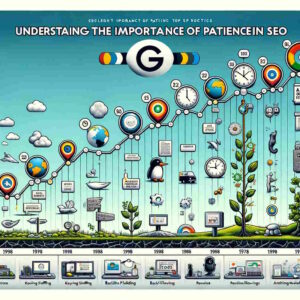Patience in regards to SEO success is the understanding and acceptance that achieving top search engine rankings and driving organic traffic is a gradual process that requires time, consistent effort, and strategic adaptation.
The three keys to effective SEO patience for success are:
- setting realistic expectations
- consistently applying best practices in content creation, technical optimization, and link building
- regularly monitoring and adapting strategies based on analytics and search engine updates.
Unlock the secrets to mastering SEO patience and propel your website to the top of search results with proven strategies and insights found in this essential guide.
Introduction

This guide is tailored to help you understand the importance of patience in the realm of Search Engine Optimization (SEO).
Our experience and expertise have shown us that the most successful SEO strategies are those that are nurtured over time, with a deep understanding of how search engines work and what they value.
In the upcoming sections, we’ll delve into the various aspects of SEO where patience plays a crucial role.
From setting realistic expectations to adapting to the ever-evolving landscape of search engines, we will provide you with the insights you need to foster a patient, strategic approach to SEO.
As you embark on this journey, remember that SEO is not a sprint, but a marathon.
It requires diligence, persistence, and a willingness to adapt. Let’s dive in and explore how patience can be your strongest ally in achieving long-term success in the world of SEO.
Understanding the Importance of Patience in SEO
The Evolution of SEO: A Brief History
Key Milestones in the Evolution of Search Engines

In the early 1990s, search engines like Archie and AltaVista revolutionized how information was accessed.
But it was Google’s emergence in 1998 that truly set the stage for modern SEO.
Google introduced algorithms that prioritized relevancy and quality, leading to a dynamic where websites had to adapt continually to stay visible.
How SEO Practices Have Changed Over Time
Over time, SEO practices have dramatically evolved.
The early 2000s saw an era of keyword stuffing and backlink flooding, tactics that would be penalized today.
The introduction of Google’s Panda and Penguin updates marked a significant shift, emphasizing quality content and ethical link-building practices.
SEO became less about exploiting loopholes and more about aligning with user intent and providing value.
Why Instant Results in SEO Are a Myth
Debunking Common SEO Misconceptions
A prevalent myth in SEO is the expectation of instant results.
Unlike paid advertising, SEO is an organic process that requires time to see significant changes in rankings.
Believing in immediate results can lead to disappointment and a misunderstanding of how SEO truly works.
It’s a strategic process that builds over time, not an overnight solution.
The Role of Algorithm Updates in SEO Timelines
Understanding the role of algorithm updates is crucial.
Search engines constantly update their algorithms to improve user experience. These updates can shift website rankings unexpectedly.
Therefore, SEO is an ongoing process of adaptation and refinement. It’s about playing the long game, continually optimizing your site to align with these updates and evolving user behaviors.
Overall, patience in SEO is rooted in understanding its history and the nature of search engines. It’s about recognizing that SEO is a long-term strategy influenced by ever-changing algorithms and market dynamics.
In the following sections, we’ll explore how to set realistic expectations and build a robust SEO strategy that stands the test of time.
Setting Realistic Expectations for SEO
Timeframe for Seeing SEO Results
Average Timelines for Different SEO Strategies

Typically, it can take anywhere from three to six months to start seeing significant movement in search rankings.
And of course it depend on the budget of what you can get done, and strategy.
For example, local SEO optimizations may yield quicker results compared to more competitive global SEO campaigns.
Long-tail keywords might bring faster visibility, whereas highly competitive keywords require more time and effort.
Case Studies: Realistic SEO Growth Examples
In our experience at Data Dailey, we’ve observed diverse timelines for SEO success.
For instance, a small e-commerce site we worked with saw a 50% increase in organic traffic within four months of implementing targeted keyword strategies.
Conversely, a large enterprise with a highly competitive niche took almost a year to achieve similar growth.
These case studies illustrate the variability and the need for patience in SEO strategies.
Factors Influencing SEO Success
Understanding Domain Authority and Its Impact
Domain Authority (DA) is a critical factor in SEO success. It’s a metric that predicts how well a website will rank on search engine result pages (SERPs).
Websites with higher DA are seen as more credible and authoritative, which can lead to higher rankings faster.
Improving your DA involves enhancing your overall SEO, such as creating quality content and building a robust backlink profile, which takes time and consistent effort.
The Effect of Competitor Strategies on Your SEO
Your SEO is not just about what you do; it’s also about what your competitors are doing. Competitor strategies can significantly influence your SEO success.
For example, if competitors intensify their SEO efforts or adjust their tactics, it may impact your visibility and require you to adapt your strategy.
Monitoring competitors and industry trends is essential to stay ahead, emphasizing the ongoing and dynamic nature of SEO.
In a nutshell, setting realistic expectations for SEO means understanding the timeframes involved and the factors that influence success.
Recognizing that SEO is a long-term strategy impacted by various dynamic elements, including domain authority and competitor actions, is crucial.
Up next, we’ll discuss how to build a solid SEO foundation, a key step in setting the stage for sustainable SEO success.
Building a Solid SEO Foundation
Keyword Research: The First Step
Tools and Techniques for Effective Keyword Research

This crucial first step involves identifying the terms and phrases your target audience uses when searching for products or services like yours.
Tools such as Google Keyword Planner, SEMrush, and Ahrefs are invaluable for uncovering these insights.
Effective techniques include analyzing search trends, understanding the intent behind searches, and identifying long-tail keywords that offer a balance between search volume and competitiveness.
Analyzing Keyword Difficulty and Search Volume
Understanding keyword difficulty and search volume is essential.
Keyword difficulty indicates how hard it will be to rank for a particular term, while search volume reflects the number of searches for that term.
High-volume keywords are often more competitive and challenging to rank for.
Therefore, a mix of high-volume terms and niche-specific long-tail keywords can create a balanced strategy, suitable for both short-term wins and long-term goals.
On-Page Optimization Essentials
Optimizing Meta Tags and Descriptions
Meta tags and descriptions play a crucial role in on-page optimization.
These elements help search engines understand the content of your pages and how they should be displayed in SERPs.
Optimizing these tags involves using relevant keywords and creating compelling descriptions that encourage clicks.
This not only improves visibility but also enhances user engagement.
Importance of Content Structure and Hierarchy
Content structure and hierarchy are vital for both user experience and search engine crawlers.
A well-structured page with clear headings (H1, H2, H3, etc.) helps search engines understand the content hierarchy and index it accordingly.
Additionally, using bullet points, short paragraphs, and including relevant keywords naturally in the content makes it more readable for users and more accessible for search engines.
Putting it all together,, building a solid SEO foundation starts with comprehensive keyword research and extends to meticulous on-page optimization.
By focusing on these critical aspects, you lay the groundwork for an SEO strategy that can withstand the dynamic nature of search engine algorithms and user behavior.
Next, we will explore the intricacies of content creation and how it intertwines with your SEO efforts.
Content Creation and SEO
Crafting Quality Content for Better Rankings
Balancing Keyword Density with Readability

A crucial aspect of this is balancing keyword density with readability.
Your content should naturally integrate keywords without compromising the flow and readability.
Overusing keywords can lead to a negative user experience and potentially harm your SEO efforts, as search engines prioritize content that provides real value to users.
Incorporating Multimedia and Visual Elements
Engaging content isn’t just about text. Incorporating multimedia and visual elements like images, videos, infographics, and interactive media can significantly enhance user engagement and retention.
These elements make your content more appealing and shareable, increasing the likelihood of it being linked to or shared on social media.
From an SEO perspective, multimedia elements can also be optimized with alt tags and file names, contributing to improved search rankings.
The Role of Content Consistency in SEO
Developing a Content Calendar
Consistency is key in content creation.
A content calendar is an invaluable tool for maintaining a regular publishing schedule.
This calendar should outline what content will be published and when, ensuring a steady stream of fresh, relevant content.
Consistent publishing signals to search engines that your website is active and up-to-date, which can positively impact your search rankings.
Updating and Repurposing Old Content
SEO isn’t just about creating new content; it’s also about maximizing the value of existing content.
Updating and repurposing old content can breathe new life into your SEO efforts.
By updating articles with current information, incorporating new keywords, and even changing formats (e.g., turning a blog post into a video), you can enhance their relevance and reach.
This approach not only improves SEO but also provides more value to your audience by keeping your content current and engaging.
All things considered, the intersection of content creation and SEO is crucial for better rankings.
High-quality, engaging, and consistent content, enhanced with multimedia and strategically updated, forms the backbone of any successful SEO strategy.
Next, we will delve into the technical aspects of SEO, another critical component in building a robust online presence.
Technical SEO: The Backbone of Your Strategy
Site Speed and Its Impact on SEO
Tools for Measuring and Improving Site Speed

Search engines like Google prioritize websites that load quickly, as fast-loading sites offer a better user experience.
Tools such as Google’s PageSpeed Insights, GTmetrix, and Pingdom can be used to measure your site’s performance.
These tools not only provide insights into how quickly your site loads but also offer actionable recommendations on how to improve site speed, such as optimizing images, leveraging browser caching, and minimizing redirects.
Case Studies: How Site Speed Impacted Rankings
Our experience at Data Dailey has shown the significant impact of site speed on rankings.
For instance, we worked with a retail client whose site speed optimization resulted in a 20% increase in page views and a 15% increase in organic traffic.
Another client, a news portal, saw a 30% improvement in bounce rate after reducing their page load time.
These cases underscore the direct correlation between site speed and improved SEO performance.
Mobile Optimization: A Necessity
Best Practices for Mobile-Friendly Design
In today’s digital landscape, mobile optimization is not just a recommendation; it’s a necessity.
A mobile-friendly design ensures that your site is easily accessible and navigable on smartphones and tablets.
This includes responsive design, where the site layout adjusts seamlessly across different screen sizes, and ensuring that buttons and links are easy to interact with on touchscreens.
Additionally, optimizing images and text for mobile screens is crucial to enhance user experience.
The Rise of Mobile Search and Its SEO Implications
The surge in mobile search usage has significant implications for SEO.
Mobile searches have overtaken desktop searches in volume, making mobile optimization a critical component of SEO strategy.
This shift has led to changes in Google’s ranking algorithms, notably the mobile-first index, where Google predominantly uses the mobile version of the content for indexing and ranking.
Sites not optimized for mobile risk losing visibility in search results, highlighting the importance of mobile-friendly SEO practices.
In conclusion, technical SEO, particularly focusing on site speed and mobile optimization, is fundamental to your overall SEO strategy.
By ensuring your website is technically sound, you not only improve your search rankings but also provide a better user experience, crucial for retaining and converting site visitors.
Next, we will explore the intricacies of link building and its role in off-page SEO.
Link Building and Off-Page SEO
The Art of Acquiring Quality Backlinks
Strategies for Natural Link Building

These backlinks act as endorsements from other websites, signaling to search engines that your content is valuable and authoritative.
Strategies for natural link building include creating high-quality, shareable content that naturally attracts backlinks, guest blogging on reputable sites, and engaging in digital PR to get mentions from news sites and industry blogs.
The key is to focus on quality over quantity, as backlinks from reputable sites carry more weight.
Analyzing Backlink Profiles of Competitors
Understanding the backlink profiles of your competitors can provide valuable insights into your own link-building strategy.
Tools like Ahrefs and SEMrush allow you to analyze where competitors are getting their backlinks from, helping you identify potential link-building opportunities.
By examining the quality and relevance of these links, you can better understand the link-building tactics that are effective in your industry and apply similar strategies to your own efforts.
Social Signals and Their SEO Influence
Leveraging Social Media for SEO Benefits
While social media signals do not directly impact search engine rankings, they indirectly influence SEO.
Active social media presence can drive traffic to your website, increase your content’s reach, and enhance brand recognition.
Encouraging shares on social media can also lead to increased backlink opportunities, as your content gets exposed to a broader audience.
Additionally, social media profiles often rank in search results for brand names, contributing to your overall online presence.
The Correlation Between Social Engagement and Rankings
There’s a notable correlation between social engagement and search rankings.
Content that performs well on social media often gains increased visibility, which can lead to more backlinks and higher organic search rankings.
Moreover, social engagement metrics like shares, comments, and likes can be indicators of content quality and relevance, which are key factors in SEO.
Therefore, integrating social media into your SEO strategy can amplify your online visibility and contribute to your overall SEO success.
Ultimately, link building and leveraging social signals are vital components of off-page SEO. Focusing on acquiring quality backlinks and harnessing the power of social media can significantly enhance your SEO efforts.
Up next, we will delve into how to effectively monitor and adapt your SEO strategy to ensure ongoing success.
Monitoring and Adapting Your SEO Strategy
Tools for Tracking SEO Progress
Reviewing Analytics and Understanding Metrics

Tools like Google Analytics provide a wealth of data, including traffic sources, user behavior, and conversion rates.
Metrics such as organic search traffic, bounce rate, and time spent on site can offer insights into how well your SEO strategies are performing.
Regularly monitoring these metrics helps you identify trends, measure progress, and make data-driven decisions.
Utilizing SEO Dashboards and Reporting Tools
SEO dashboards and reporting tools like Moz, SEMrush, and Google Search Console are indispensable for tracking your SEO progress.
These tools offer a comprehensive view of your SEO performance, including keyword rankings, backlink profiles, and technical SEO issues.
By utilizing these dashboards, you can get a clear picture of your SEO health, monitor changes over time, and quickly identify areas that require attention or improvement.
When to Pivot Your SEO Tactics
Identifying Plateaus and Declines in Performance
It’s crucial to recognize when your SEO tactics are no longer yielding the desired results.
Plateaus or declines in performance can be indicators that your strategy needs a pivot.
This could mean revising your keyword strategy, enhancing your content, or addressing new technical SEO issues.
Staying attuned to these performance metrics enables you to make timely adjustments and maintain your SEO momentum.
Adapting to Search Engine Algorithm Changes
Search engine algorithms are constantly evolving, and keeping up with these changes is vital for SEO success.
When a major algorithm update occurs, it can significantly impact your search rankings.
Staying informed about these updates and understanding their implications is crucial.
Adapting your SEO strategy in response to these changes, such as focusing more on user experience or mobile optimization, can help safeguard your site against potential negative impacts.
Condensing the points, effective SEO is not a set-it-and-forget-it strategy.
It requires continuous monitoring, analysis, and adaptation.
By utilizing the right SEO tools and being prepared to pivot your tactics in response to performance metrics and algorithm updates, you can ensure that your SEO strategy remains effective and resilient.
Up next, we’ll explore the psychological aspect of SEO patience, an often-overlooked but crucial element of long-term SEO success.
The Psychological Aspect of SEO Patience
Managing Expectations and Stress
Techniques for Managing SEO-Related Stress

It’s crucial to manage this stress to maintain a clear and strategic approach.
Techniques such as mindfulness and regular breaks can help mitigate the anxiety associated with fluctuating rankings and the pressure to achieve quick wins.
It’s also beneficial to stay informed about SEO trends and algorithm changes, as this knowledge can reduce uncertainty and the stress that comes with it.
Setting Achievable Milestones and Celebrating Progress
Another key aspect of managing SEO stress is setting achievable milestones.
Breaking down your overall SEO goals into smaller, realistic targets can make the process more manageable and less daunting.
Celebrating these smaller victories not only boosts morale but also provides motivation to continue.
For example, achieving a first-page ranking for a long-tail keyword might be a smaller milestone worth celebrating on the way to more ambitious goals.
Long-Term Thinking in SEO
Developing a Sustainable SEO Mindset
Adopting a long-term mindset is essential in SEO.
This approach involves understanding that SEO is a continuous process that requires ongoing effort and adaptation.
A sustainable SEO mindset accepts that not all tactics will yield immediate results and recognizes the value in gradually building a robust and resilient online presence.
This mindset helps in making strategic decisions that contribute to sustained growth over time, rather than seeking quick fixes.
Success Stories of Long-Term SEO Strategies
There are numerous success stories that highlight the benefits of a long-term SEO approach.
For instance, a client who consistently focused on creating quality content and building a solid backlink profile over a year saw a 200% increase in organic traffic.
Another success story involves a company that, through persistent SEO efforts and adaptations to algorithm changes, achieved and maintained a top-ranking position for several competitive keywords in their industry.
In conclusion, the psychological aspect of SEO patience is pivotal.
Managing stress and expectations, setting achievable milestones, and cultivating a long-term, sustainable mindset are all integral to SEO success.
These practices not only aid in maintaining a strategic approach to SEO but also contribute to personal well-being and professional satisfaction.
Next, we will provide a summary of frequently asked questions that are relevant to the topic of SEO patience.
Frequently Asked Questions (FAQs)
How Long Does It Typically Take to See SEO Results?
Variances in SEO Timelines Across Industries
The time it takes to see tangible results from SEO efforts can vary widely depending on several factors, including industry competitiveness, current website authority, and the nature of the SEO strategies implemented.
Generally, it can take anywhere from three to six months to start seeing significant movement in rankings.
For highly competitive industries, it may take even longer. It’s important to set realistic expectations and understand that SEO is a long-term investment.
Can I Speed Up My SEO Results?
Ethical Acceleration Techniques vs. Black Hat Tactics
While it’s natural to want faster results, it’s crucial to adhere to ethical SEO practices.
Techniques like improving website loading speed, creating high-quality content regularly, and obtaining backlinks from reputable sites can accelerate progress.
However, resorting to black hat tactics, such as keyword stuffing or buying backlinks, can lead to penalties from search engines.
Ethical, sustainable strategies may take longer but ensure lasting results and maintain your site’s integrity.
How Do Algorithm Changes Affect My SEO Strategy?
Adapting to Google’s Core Algorithm Updates
Algorithm changes can significantly impact your SEO strategy. Google’s core updates are designed to improve the overall search experience by delivering more relevant, high-quality search results. When these updates occur, it’s essential to review your SEO strategy and make necessary adjustments.
This could involve focusing more on user experience, ensuring mobile-friendliness, or updating content to maintain relevance.
Staying informed about these updates and being flexible in your approach is key to adapting successfully.
Is Investing in SEO Still Worth It in [Current Year]?
The Evolving Landscape of SEO and ROI Considerations
Investing in SEO remains a highly valuable strategy, even as the digital landscape continues to evolve. SEO not only helps in improving online visibility but also contributes to building brand credibility and trust.
With the increasing reliance on online search for information, products, and services, SEO offers a significant return on investment (ROI) by attracting targeted, organic traffic to your site.
The key is to stay updated with the latest SEO trends and continuously refine your strategy to align with the current best practices.
In essence, these FAQs address some of the most common inquiries related to SEO and patience. Understanding the typical timeline for seeing results, the importance of ethical practices, the impact of algorithm changes, and the ongoing value of investing in SEO are crucial for anyone looking to succeed in the digital landscape. Next, we will conclude this guide with a final section summarizing key takeaways and offering final thoughts on the role of patience in SEO.
Conclusion
Embracing the Journey of SEO
Recap of Key Takeaways
Summary of Essential SEO Patience Principles

Key takeaways include the importance of setting realistic expectations, understanding the evolving nature of search engines, and building a solid foundation through effective keyword research and on-page optimization.
We emphasized the significance of content quality, technical SEO, and the strategic building of backlinks.
Monitoring and adapting your strategy in response to analytics and search engine updates is also vital.
Final Thoughts on Patience and SEO
Looking Ahead: The Future of SEO and Patience
Looking ahead, the future of SEO continues to be dynamic and evolving.
As search engines become more sophisticated in understanding user intent and delivering relevant content, the importance of a well-thought-out, patient SEO strategy becomes increasingly apparent.
Patience in SEO is not just about waiting for results; it’s about committing to continuous learning, adapting to new trends and algorithm updates, and persistently refining your strategy to align with best practices.
In closing, embracing the journey of SEO with patience and dedication is essential.
SEO a continuous process of learning, testing, and growing.
By applying the principles outlined in this guide, you’re well on your way to developing an SEO strategy that not only improves your search engine rankings but also builds a lasting and credible online presence.
Remember, in the world of SEO, patience is not just a virtue; it’s a fundamental component of success.
Bonus: 20 SEO Patience Affirmations to Use
Affirmations are powerful, positive statements that can help to challenge and overcome self-sabotaging and negative thoughts. When you repeat them often, and believe in them, you can start to make positive changes. In the context of SEO, affirmations can be particularly beneficial. They can help you maintain a positive and patient mindset, essential for navigating the often slow and unpredictable nature of SEO success.
To use these affirmations effectively, repeat them regularly – ideally daily. You can say them out loud, write them down, or even think them while meditating. The key is consistent reinforcement to cultivate a patient and positive mindset towards your SEO efforts.
Here are 20 affirmations you can use to build more patience with your SEO efforts:
- I am patient and persistent in my SEO strategies.
- Every step I take in SEO brings me closer to my goals.
- I trust in the process and timeline of organic growth.
- My efforts today lay the foundation for tomorrow’s success.
- I am resilient in the face of SEO challenges and changes.
- Each day, I gain more knowledge and insight into SEO.
- I celebrate small wins and progress in my SEO journey.
- My patience in SEO is rewarded with lasting results.
- I am confident in my ability to adapt to SEO trends.
- I focus on quality and value in my SEO practices.
- I am a strategic thinker and planner in my SEO efforts.
- My commitment to SEO grows stronger each day.
- I embrace learning and growth in my SEO skills.
- I am optimistic about the future of my SEO success.
- Patience is my strength in achieving SEO objectives.
- I am a positive and proactive member of the SEO community.
- I am grateful for every learning opportunity SEO provides.
- I maintain a calm and focused mindset in my SEO work.
- My dedication to SEO is unwavering and disciplined.
- I look forward to the long-term benefits of my SEO efforts.
Patience in SEO isn’t just a practice; it’s a mindset. By using these affirmations, you can cultivate the patience and persistence needed for long-term success in SEO.
Remember, SEO is a marathon, not a sprint.
Your commitment and positive attitude, reinforced by these affirmations, will guide you through the evolving landscape of SEO towards achieving your digital marketing goals.

1 Comment
Matt
Great article thank you!